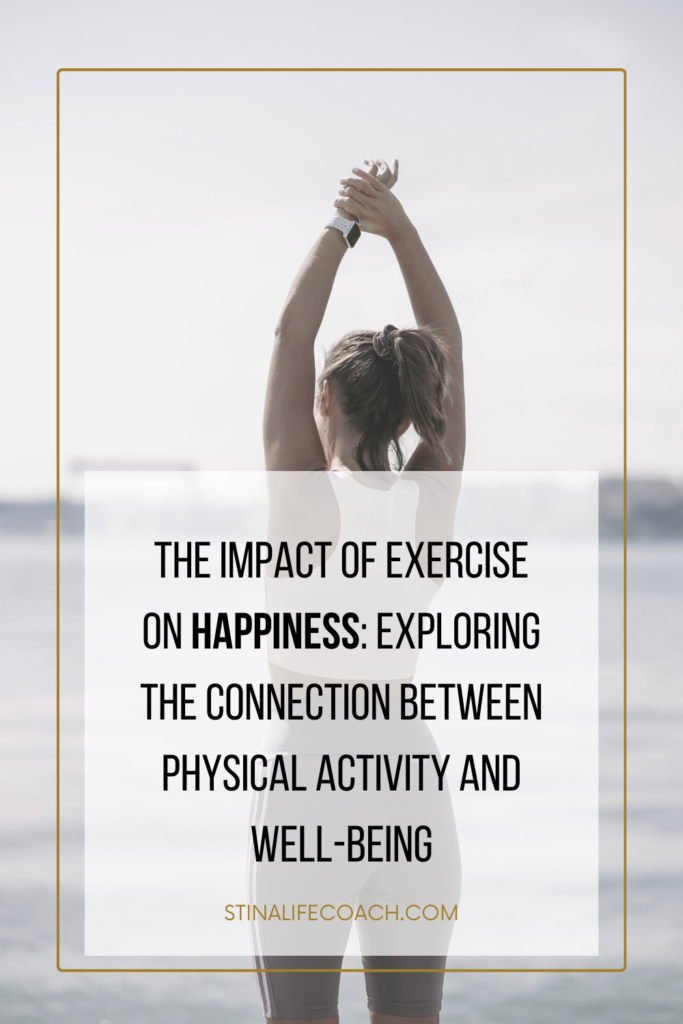The Impact of Exercise on Happiness: Exploring the Connection Between Physical Activity and Well-Being
Do you ever feel happier and more energized after a good workout? You’re not alone! Studies show that people with a higher physical activity level tend to have higher life satisfaction and happiness. In this blog post, we’ll explore the connection between physical activity and happiness and provide tips for incorporating exercise into your daily routine.

The Science Behind Exercise and Happiness
Exercise has been shown to release endorphins, which are natural chemicals that make you feel good. Endorphins interact with receptors in your brain, reducing your perception of pain and triggering a positive feeling in your body. This is why people often describe feeling a “runner’s high” after a workout.
In addition to endorphins, exercise also increases the production of serotonin and dopamine, two neurotransmitters that play a key role in regulating mood, sleep, and appetite. By increasing the levels of these chemicals in our brain, exercise can help reduce stress and anxiety and improve our overall well-being.
Exercise also has physical benefits that can contribute to our happiness. It can help us maintain a healthy weight, improve our cardiovascular health, and boost our energy levels. By feeling better physically, we’re more likely to feel happier and more confident in our daily lives.
RELATED: YOU CAN START OVER WHENEVER YOU WANT

The Stress-Relieving Benefits of Exercise
Many people turn to exercise as a way to relieve stress and anxiety. While exercise may seem like just another thing to add to our to-do list, it can actually be a powerful tool for reducing stress and anxiety.
When we exercise, we are in control of our bodies and our movements. This sense of control can be empowering and help us feel more confident and less stressed. Exercise can also enhance mindfulness, which is the practice of being present in the moment and paying attention to our thoughts and feelings without judgment. Many types of exercise, such as yoga and tai chi, incorporate mindfulness practices that can help us reduce stress and anxiety.
Exercise can also improve the quality of our sleep, which can have a positive impact on our mood and stress levels. Getting enough sleep is essential for reducing stress and anxiety. By incorporating exercise into our daily routine, we can improve the quality of our sleep and reduce our stress levels.
By incorporating exercise into our daily routine, we can enjoy the many stress-relieving benefits it has to offer. Whether it’s going for a run, taking a yoga class, or simply going for a walk, exercise can be a powerful tool for reducing stress and anxiety and improving our overall well-being.

Tips for Incorporating Exercise into Your Daily Routine
If you’re not already exercising regularly, it can be challenging to know where to start. Here are some tips for incorporating exercise into your daily routine:
- Start small: It’s essential to start with small, achievable goals. You can begin by walking for 10-15 minutes each day and gradually increase the time or intensity of your workout.
- Make it a habit: Consistency is key when it comes to exercise. Try to exercise at the same time every day to create a routine. This will make it easier to stick to your goals in the long term.
- Find activities you enjoy: Exercise doesn’t have to be boring or monotonous. Experiment with different types of physical activity until you find something you enjoy. This could be dancing, hiking, swimming, or cycling.
- Get a workout buddy: Having a friend or family member to exercise with can make it more fun and keep you accountable. You can motivate each other to stay on track and celebrate your progress together.
RELATED: 10 SIGNS YOU NEED MORE SELF-CARE

The Power of Exercise for a Happier Life
In conclusion, the benefits of exercise go beyond just physical health. Exercise has been shown to have a significant impact on our mental health and overall well-being. By releasing endorphins and increasing the production of serotonin and dopamine, exercise can help reduce stress and anxiety and improve our mood.
Incorporating exercise into our daily routine doesn’t have to be a daunting task. Starting small and gradually increasing the intensity or duration of our workout can help us achieve our goals without feeling overwhelmed. By creating a routine and finding activities we enjoy, we can make exercise a regular part of our lives.
Moreover, it’s important to note that the benefits of exercise are not limited to just the short term. By maintaining a consistent exercise routine, we can reduce the risk of chronic diseases, improve our quality of life, and increase our longevity.
So, if you’re looking for a simple yet effective way to improve your happiness and overall well-being, exercise is a great place to start. With dedication, motivation, and support from friends and family, you can make exercise a habit that brings joy and fulfilment to your life.





